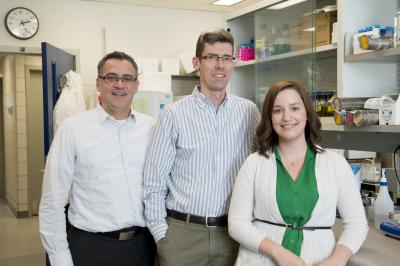Study shows how streptococcal bacteria can be used to fight colon cancer

Western University researchers Dr. David Hess and Dr. John McCormick and lead author Kelcey Patterson show how the bacteria primarily responsible for causing strep throat can be used to fight colon cancer. By engineering a streptococcal bacterial toxin to attach itself to tumor cells, they are forcing the immune system to recognize and attack the cancer. Credit: Schulich School of Medicine & Dentistry, Western University
By engineering a streptococcal bacterial toxin to attach itself to tumour cells, they are forcing the immune system to recognize and attack the cancer.
Kelcey Patterson, a PhD Candidate at Western and the lead author on the study, showed that the engineered bacterial toxin could significantly reduce the size of human colon cancer tumours in mice, with a drastic reduction in the instances of metastasis. By using mouse models that are stripped of their immune system, they were able to create a 'humanized mouse' – one that would not only grow human colon cancer cells, but would also support a human immune system, to test the anti-cancer immunotherapy.
The work was directed by John McCormick, PhD, an Associate Professor in the Department of Microbiology and Immunology and Scientist at the Lawson Health Research Institute. “Our team has been studying these bacterial toxins called 'superantigens' for their role in bacterial infections. But we are now utilizing the power of these toxins to re-direct the immune system to go after cancer cells.”
McCormick says their research provides important pre-clinical evidence that this may work in humans. “This work represents a 'next-generation immunotoxin' that we hope will eventually lead to a new class of cancer therapeutic.”
The research was funded by the Canadian Institutes of Health Research. Jennifer Dixon Pittaro, Peter Bastedo, David Hess and Mansour Haeryfar all contributed to the paper entitled “Control of established colon cancer xenografts using a novel humanized single chain antibody-streptococcal superantigen fusion protein targeting the 5T4 oncofetal antigen.”
McCormick and his colleagues have now received a new grant from the Cancer Research Society to develop different toxin and antibody combinations to fight other types of cancer.
Media Contact
More Information:
http://www.uwo.caAll latest news from the category: Health and Medicine
This subject area encompasses research and studies in the field of human medicine.
Among the wide-ranging list of topics covered here are anesthesiology, anatomy, surgery, human genetics, hygiene and environmental medicine, internal medicine, neurology, pharmacology, physiology, urology and dental medicine.
Newest articles

Properties of new materials for microchips
… can now be measured well. Reseachers of Delft University of Technology demonstrated measuring performance properties of ultrathin silicon membranes. Making ever smaller and more powerful chips requires new ultrathin…

Floating solar’s potential
… to support sustainable development by addressing climate, water, and energy goals holistically. A new study published this week in Nature Energy raises the potential for floating solar photovoltaics (FPV)…

Skyrmions move at record speeds
… a step towards the computing of the future. An international research team led by scientists from the CNRS1 has discovered that the magnetic nanobubbles2 known as skyrmions can be…





















